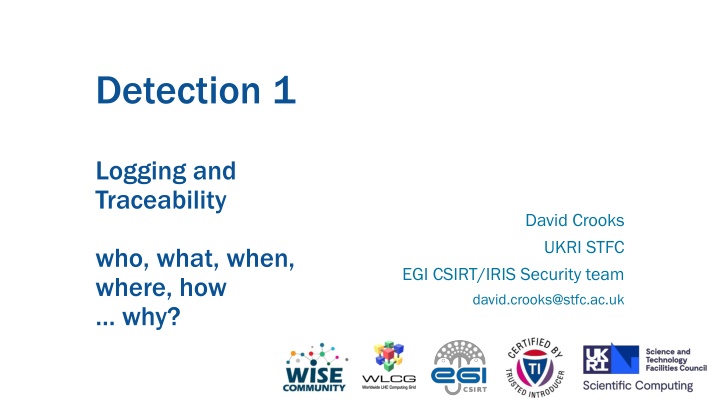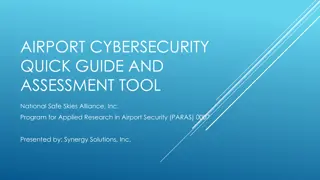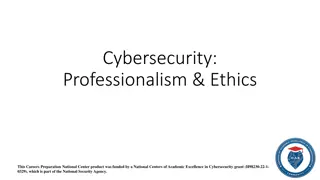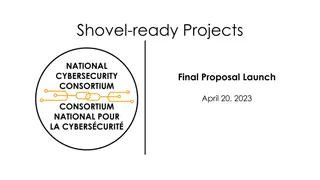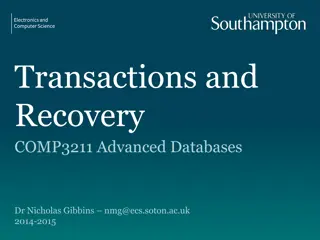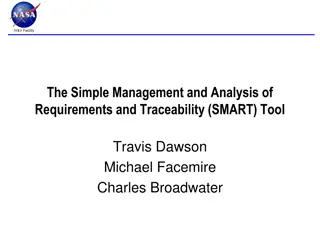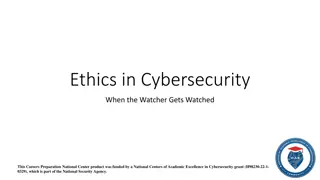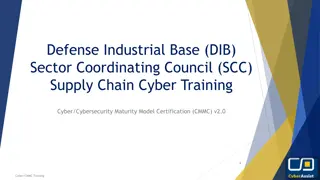Importance of Logging and Traceability in Cybersecurity
Logging and traceability play a crucial role in cybersecurity, providing essential insights into system activities and aiding in incident response. This article explores the significance of logging, examples of log analysis, and the types of logs related to host and service activities.
Download Presentation

Please find below an Image/Link to download the presentation.
The content on the website is provided AS IS for your information and personal use only. It may not be sold, licensed, or shared on other websites without obtaining consent from the author.If you encounter any issues during the download, it is possible that the publisher has removed the file from their server.
You are allowed to download the files provided on this website for personal or commercial use, subject to the condition that they are used lawfully. All files are the property of their respective owners.
The content on the website is provided AS IS for your information and personal use only. It may not be sold, licensed, or shared on other websites without obtaining consent from the author.
E N D
Presentation Transcript
Detection 1 Logging and Traceability David Crooks UKRI STFC who, what, when, where, how why? EGI CSIRT/IRIS Security team david.crooks@stfc.ac.uk
Introduction Logging basics Central logging Data Protection Network logging
Preamble Assessing your risk and having visibility of your services and systems is absolutely essential Everything we re about to discuss assumes that to some extent our area has been assessed for risk
Why do we log? Input To know what happened in as much detail as necessary Often, security concerns are an extension of operations What happened? When did it happen? Where did it happen? ? How did it happen? Why did it happen? Output
Examples Why did this data transfer fail? Why did this job only complete partially? Which endpoints were involved in this process? What did the attacker do?
Day to day life Logs are an integral part of our technical lives But as we head heard yesterday, with this ubiquity comes careful consideration
Host/service logs Application logs System logs Application System
Host/service logs Application logs Apache Drupal Ceph Dcache ... Application System
Host/service logs Application logs These depend on the service Application Talk about this again in traceability, but: service owners are best placed to understand what is useful! System
Host/service logs System logs Give us an understanding of the behaviour of the system itself Direct access via ssh System behaviour Auditing over time Application OS (Paths will be for RHEL Distros)
Host/service logs System logs /var/log/audit.log type=USER_AUTH msg=audit(1655751006.984:3758): pid=26347 uid=0 auid=4294967295 ses=4294967295 subj=system_u:system_r:sshd_t:s0-s0:c0.c1023 msg='op=pubkey_auth rport=35186 acct="centos" exe="/usr/sbin/sshd" hostname=? addr=A.B.C.D terminal=? res=success' type=USER_AUTH msg=audit(1655751006.984:3759): pid=26347 uid=0 auid=4294967295 ses=4294967295 subj=system_u:system_r:sshd_t:s0-s0:c0.c1023 msg='op=key algo=ssh-rsa size=4096 fp=SHA256:48:43:a1:08:47:36:a3:69:1a:d0:72:24:58:f3:e3:07:7d:99:ce:0b:bd:d5:cd:fb:10:bc:37:18:cf:f8:4a:a4 rport=35186 acct="centos" exe="/usr/sbin/sshd" hostname=? addr=A.B.C.D terminal=? res=success' type=USER_ACCT msg=audit(1655751006.994:3760): pid=26347 uid=0 auid=4294967295 ses=4294967295 subj=system_u:system_r:sshd_t:s0-s0:c0.c1023 msg='op=PAM:accounting grantors=pam_unix,pam_localuser acct="centos" exe="/usr/sbin/sshd" hostname=X.Y.Z addr=A.B.C.D terminal=ssh res=success' type=CRYPTO_KEY_USER msg=audit(1655751006.994:3761): pid=26347 uid=0 auid=4294967295 ses=4294967295 subj=system_u:system_r:sshd_t:s0-s0:c0.c1023 msg='op=destroy kind=session fp=? direction=both spid=26348 suid=74 rport=35186 laddr=A.B.C.D 6 lport=22 exe="/usr/sbin/sshd" hostname=? addr=A.B.C.D terminal=? res=success' type=USER_AUTH msg=audit(1655751006.996:3762): pid=26347 uid=0 auid=4294967295 ses=4294967295 subj=system_u:system_r:sshd_t:s0-s0:c0.c1023 msg='op=success acct="centos" exe="/usr/sbin/sshd" hostname=? addr=A.B.C.D 6 terminal=ssh res=success' type=CRED_ACQ msg=audit(1655751006.996:3763): pid=26347 uid=0 auid=4294967295 ses=4294967295 subj=system_u:system_r:sshd_t:s0-s0:c0.c1023 msg='op=PAM:setcred grantors=pam_env,pam_unix acct="centos" exe="/usr/sbin/sshd" hostname=X.Y.Z addr=A.B.C.D terminal=ssh res=success' type=LOGIN msg=audit(1655751006.996:3764): pid=26347 uid=0 subj=system_u:system_r:sshd_t:s0-s0:c0.c1023 old-auid=4294967295 auid=1000 tty=(none) old-ses=4294967295 ses=215 res=1 type=USER_ROLE_CHANGE msg=audit(1655751007.128:3765): pid=26347 uid=0 auid=1000 ses=215 subj=system_u:system_r:sshd_t:s0- s0:c0.c1023 msg='pam: default-context=unconfined_u:unconfined_r:unconfined_t:s0-s0:c0.c1023 selected- context=unconfined_u:unconfined_r:unconfined_t:s0-s0:c0.c1023 exe="/usr/sbin/sshd" hostname=X.Y.Z addr=A.B.C.D terminal=ssh res=success' type=USER_START msg=audit(1655751007.145:3766): pid=26347 uid=0 auid=1000 ses=215 subj=system_u:system_r:sshd_t:s0-s0:c0.c1023 msg='op=PAM:session_open grantors=pam_selinux,pam_loginuid,pam_selinux,pam_namespace,pam_keyinit,pam_keyinit,pam_limits,pam_systemd,pam_unix,pam_lastlog acct="centos" exe="/usr/sbin/sshd" hostname=X.Y.Z addr=A.B.C.D 6 terminal=ssh res=success' Application OS
Host/service logs System logs /var/log/audit.log aureport can be used to get summary information Application OS
Host/service logs System logs /var/log/audit.log Application OS
Host/service logs System logs Auditbeat Part of the elasticsearch Beats set of tools that can also extract and effectively parse audit data Application OS
Host/service logs System logs /var/log/messages Records global log messages, system notifications including those during boot Application OS
Host/service logs System logs /var/log/secure Records successes and failures for users using ssh to access the system Application OS
Host/service logs System logs /var/log/secure Jun 19 22:18:36 hostname sshd[26877]: Accepted publickey for user from A.B.C.D port 60096 ssh2: RSA SHA256: Application OS Success!
Host/service logs System logs /var/log/secure Jun 20 19:08:58 hostname sshd[7555]: Invalid user admin from A.B.C.D port 36844 Application OS
Host/service logs System logs /var/log/secure Jun 20 19:08:58 hostname sshd[7555]: Invalid user admin from A.B.C.D port 36844 Application OS
Host/service logs System logs /var/log/secure this is why you harden your systems (although only a real problem if they succeed) Application A primary source of checking for malicious access OS Unless?
A successful attacker Gains access via a weak password (password2023-2) Installs a compiler, builds some code hides their tracks by truncating the logs
Central logging Logs are data Vulnerable to deletion or corruption Back them up!
Central logging One of the single most important things to do for the security of a service Helps incident response Helps correlate logs between hosts
rsyslog rsyslog is a well-featured logging engine rsyslog and syslog-ng are both feature-rich successors to the original syslog https://www.rsyslog.com
rsyslog and other tools Especially at this point, storing raw logs is not the most useful Use a tool like elasticsearch to allow better searching an querying of the data
OSSEC/Wazuh OSSEC is a very nice host- based IDS that will aggregate logs in a server/client topology https://www.ossec.net Customisable rules Very flexible
OSSEC/Wazuh Wazuh is a modern development of OSSEC that integrates tightly with elasticsearch https://wazuh.com/ Important when considering defence in depth having one exactly one tool to monitor your system is not optimal (necessary )
Wazuh/OSQuery Wazuh can monitor many useful things at the host level File integrity + checksums Configuration Assessment Extended Detection and Response https://wazuh.com/ OSQuery is a nice tool that provides an SQL interface to system information https://osquery.io
System + application logs Discussed some key system logs Application logs are best understood by their service owners: how to choose what you need?
System + application logs We can t store an infinite amount of logs And we don t want to too much data looks like noise
Data protection I am not a lawyer
Data protection GDPR We are in an era where individual privacy rights are rightly taken particularly seriously CERN OC11 Development of UK data protection laws This is not something that should hinder our security work Working with laws in other countries
GDPR and CSIRT activities In GDPR and associated findings the exchange of logs for incident response is recognized as a useful activity https://www.first.org/blog/201712 11_GDPR_for_CSIRTs We do need to be careful about what we store, why, and for how long
Log retention In WLCG, for a long time 90 days was the retention period set by policy Now moving towards 180 days or more: why?
Log retention The number of incidents that have their beginning many months ago Only having logs for 90 or 180 days means we lose visibility 12 or 13 months is where we might set our sights
Log retention: practical matters Of course, there are practical matters Logs take up room Central logging also makes capacity planning easier Build to a set of services that are logged Continuous improvement is important
Log retention: practical matters Our architecture will suggest where and how many logs we can keep This can and should evolve over time Focus on sustainable development
Traceability For security, we want the logs that will help us piece together a set of events When did someone gain access? What did they do on the host? Where did they go next? What other hosts did they talk to?
Traceability Traceability is the ability for us to trace the activity associated with a particular user and/or particular workflow Want to be able to track the entire lifecycle Initiation Primary events (External) communications Closeout
Traceability Core system logs are essential; for application logs we want anything that helps piece these together Debug logs don t help with this It is likely that this will also evolve over time Make a plan and iterate based on your risks and resources
Split traceability Our the, current circumstances, it is highly likely that the logs from a particular service or even facility will not be sufficient to track the activity of a user or group Why?
Split traceability In research and education, invariably work as part of a bigger infrastructure, federation or federation of federations
Split traceability Many (most!) of our activities involve many services composed together WLCG pilot jobs Cloud services We can no longer rely on the logs on a single host/in a single facility to assemble the full picture of a user s activity
grid jobs: before Job Site logs
pilot jobs: after Pilot Identity Provider Job Site CSIRT coordination
Cloud services Individual code Project services Project infrastructure OpenStack infrastructure
How do we check we our traceability? Planning and policy Collaboration and cooperation Testing Find use cases that are appropriate for you and try them out!
Network logging We ve talked about host based logs What s happening on the network?
Sources of network logs Routers Host-based generators Monitoring
